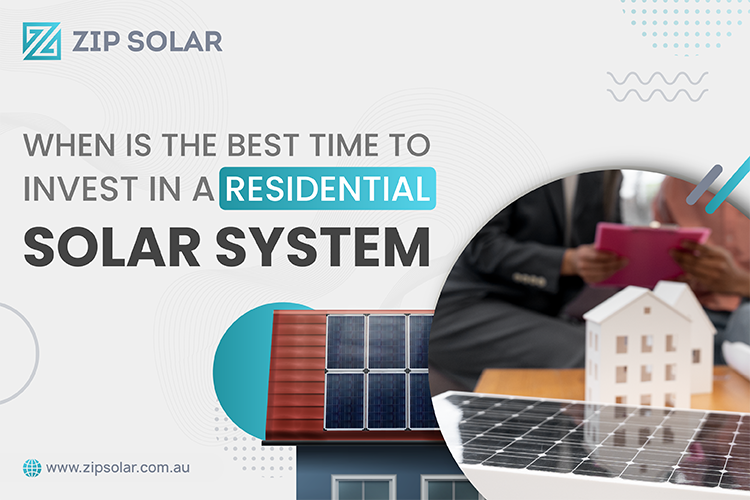
Residential solar systems are a cost-effective as well as a sustainable solution for homeowners to invest in to fulfill their energy requirements. Reducing your carbon footprint on the planet, and being conscious about the climate change situation are some other reasons why homeowners want to invest in residential solar systems.
But many of them got confused about when they should invest in residential solar systems. If you are also one of them and want to know when is the best time to invest in a residential solar system, then read this blog till the end and you will get your answer.
Here is a list of factors that will help you to find the right time to invest in solar for your home.
Affordable Cost:
Over the last decade, residential solar systems have become more affordable for any homeowner. More production of solar systems, more popularity, technological advancements, and government incentives are the reasons behind the affordable cost of solar for homes. Therefore, because of the affordable cost at the present time, homeowners are preferring current time to invest in residential solar systems.
Government Incentives:
Investment decisions for residential solar systems also depend on government incentives. Many nations and states provide financial incentives to homes that install solar panels, such as tax credits, rebates, and grants.
The upfront cost of choosing solar for the home can be greatly reduced by these incentives, increasing their financial appeal. You can also check government incentives and programs in your area to know what is the best time to install a residential solar system.
Electricity Cost:
Electricity cost is another major factor to consider before installing a residential solar system. The financial benefits of solar panel investment increase if you live in a location with high electricity costs.
The residential solar system helps you in decreasing your dependency on the grid by producing your own electricity, which will result in significant financial savings. Calculate the possible savings from switching to solar for home by examining your current electricity costs and anticipated future growth.
Technology Advancement:
Solar technology is always developing, and as a result, solar panels are becoming more efficient and cost-effective. For example, the technological advancement of the 6.6kW solar system makes it a suitable choice for residential solar systems. Because of various technological advancements in solar systems, it offers many financial and environmental benefits.
Hence, checking out various solar systems and finding which one serves best according to your energy requirement is important. Also, don’t forget to upgrade your residential solar system with time. As the future always brings better technological advancement.
Sustainable Lifestyle:
Homeowners who are aware of the positive impact of solar systems on the environment and want to live a sustainable lifestyle, should invest in solar for home now. Switching to renewable energy sources is essential because climate change and its negative effects on the environment are urgent challenges.
You can reduce your carbon footprint and help the environment by investing in solar power. Apart from the financial benefit, investing in solar energy also contributes to a sustainable future for future generations.
Plans for Home Ownership:
When you are thinking about the right time to invest in a residential solar system, it is essential to consider your homeownership plans and the length of your stay in the current home. A return on investment from installing solar panels often takes many years to materialize.
Consider whether the prospective advantages exceed the up-front expenditures if you intend to sell your house soon. It becomes more advantageous to invest in solar, though, if you want to stay in your home for a long time because you will have plenty of time to profit from its financial and environmental advantages.
Net Metering Policies:
You can sell extra electricity produced by your solar panels back to the grid by using the Net Metering policy. This helps you reduce your electricity cost more. Though, Net Metering policy differs per different locations.
Some regions have many beneficial Net Metering policies, increasing the return on solar investment. Hence, make sure that you learn about and evaluate your region's Net Metering policies before taking the decision of installing a residential solar system.
Residential solar system investment is a major investment that can help you save more money getting wasted on high electricity bills. It’s important to find out the right time to invest in a residential solar system to get the maximum results.
As we discussed above, the right time to invest may change based on a person's specific situation and other factors such as lower solar costs, government incentives, Net Metering regulations, high electricity prices, environmental impact, homeownership plans, and technology advancements.
Though the market is now in a good place for homeowners who want to install residential solar systems, you can make an informed choice and set off on a sustainable path to energy independence, economic savings, and a better future by carefully considering the above-mentioned factors for you.
Learn more by visiting our website at zipsolar.com.au or call us at 1300 947 765. Let's make your home greener and more cost-effective with solar energy.
